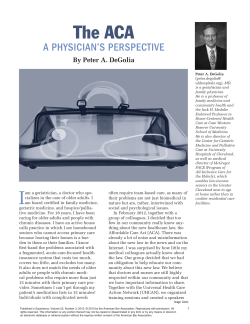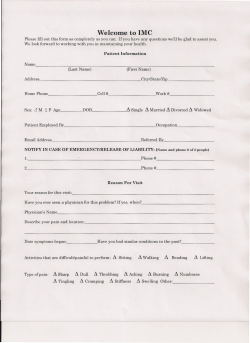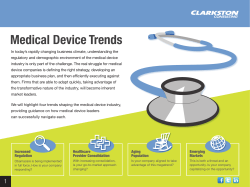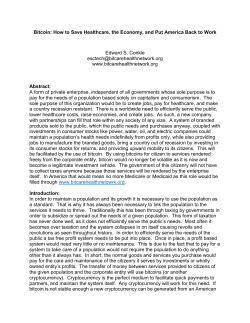
How to Manage Conflict of Interest in Peer Review Andrew Rowe, CEO
How to Manage Conflict of Interest in Peer Review Andrew Rowe, CEO AllMed Healthcare Management www.allmedmd.com © AllMed Healthcare Management, Inc. Overview • Defining and recognizing conflict of interest (COI) • COI in hospital peer review • Consequences of not managing COI • Joint Commission and Centers for Medicare & Medicaid Services standards for dealing with COI • Key components of managing COI • Examples of how COI can impact hospitals • The role of external peer review in managing COI © AllMed Healthcare Management, Inc. Conflict of Interest (COI): Inherent in Any Organization • Risk of conflict – Presents a threat to the success and credibility of any organization • Managing COI – An essential component of maintaining quality and integrity © AllMed Healthcare Management, Inc. Conflict of Interest in Hospital Peer Review • COI – A situation in which financial, professional or other personal considerations have the potential to compromise or bias professional judgment – Inevitable in the hospital setting • Two types of COI – Real: A reviewer has a conflict of interest that prevents him/her from making an unbiased decision, providing unbiased advice, exercising independent judgment, or being objective with respect to evaluating a case – Apparent: Personal interests raise questions about a reviewer’s ability to review a case fairly © AllMed Healthcare Management, Inc. Conflict of Interest: The No. 1 Impediment to Effective Peer Review • Hospitals perform peer review to ensure that their physicians are: – Properly credentialed & privileged – Competent to perform procedures – Adequately trained to safely treat patients, while providing quality care • Peer Review Committee carries the potential for COI, or the difficulty of effectively identifying and resolving performance issues – Social or professional relationships – Organizational culture & dynamics – Too few physicians in a specialty to ensure objectivity © AllMed Healthcare Management, Inc. Hospital Dynamics That Contribute to COI • Physician authority and autonomy • Unspoken rules of the organization • Shortcomings of the peer review committee © AllMed Healthcare Management, Inc. Physician Authority and Autonomy: Ingrained Into Hospital Culture • Physician authority – Physicians have long been regarded as figures of power – Legitimized by restrictions on who can practice medicine • Physician autonomy – Physicians have the freedom to exercise their judgment in the best interest of the patient without interference – Based on the premise that physicians will act competently and put the wellbeing of the patient ahead of their own personal interests • Hospital staff or administration may be reluctant to question or challenge a physician – Revenue generation pressures – Fear of retaliation © AllMed Healthcare Management, Inc. Unspoken Rules of the Organization: Reluctance to Report Colleagues • Misconduct or medical errors may not be reported, exposing patients to risks • A survey of 3,000 physicians, published in JAMA in 2010, found that: – About one third who knew of an incompetent colleague did not report the person to the relevant authorities • Reasons for not reporting – – – – Belief that someone else would take action Belief that nothing would happen as a result of a report Fear of retribution Quid pro quo in physician & nursing relationships DesRoches et al. JAMA. 2010;304:187-193. © AllMed Healthcare Management, Inc. Shortcomings of the Peer Review Committee • Physicians’ overloaded schedules – Involvement in a peer review committee presents yet another time-consuming responsibility – The process may be delayed, or reviews may not receive the attention they require • Some physicians simply do not have the training or experience to conduct effective peer review • Lack of uniformity in the peer review process • Inconsistent application of protocols and procedures • Lack of oversight – Some hospitals peer review committees act with little oversight from the medical executive committee © AllMed Healthcare Management, Inc. Consequences of Not Managing COI: What Happens When Peer Review Fails • Between 1992 and 2002, cardiologists and surgeons at Redding Medical Center (RMC) performed unnecessary procedures and operations on more than 600 patients – Hospital leadership and medical staff repeatedly ignored quality complaints • Records indicated that peer review was not performed beginning as early as 1992 – Quality assurance entities repeatedly certified or accredited the institution – Hospital administration acted to protect its cardiac program from quality and peer review because patient care suspected to be negligent was so profitable • RMC eventually paid $500 million in combined negligence awards and the hospital was sold • The valuation and reputation of the corporation that owned the hospital was damaged Rogan et al. Disaster Analysis Redding Medical Center Congressional Report. June 1, 2008. © AllMed Healthcare Management, Inc. More Comprehensive Peer Reviews Needed to Meet Joint Commission Standards • In 2007, the Joint Commission instituted new standards for monitoring performance and intervening when safety and quality-of-care concerns are identified • Hospitals of all sizes are required to demonstrate that objective peer review is in for credentialing, privileging & physician performance evaluations • Two types of reviews are required to ensure physician competence – Ongoing professional practice evaluation (OPPE) – Focused professional practice evaluation (FPPE) • Hospital administrators and internal peer review committees must always consider COI in light of these requirements that call for more comprehensive peer reviews © AllMed Healthcare Management, Inc. Centers for Medicare & Medicaid Services (CMS) Case Review Guidelines • Every effort should be made to avoid potential conflicts of interest • “Whenever possible, also avoid assigning a case to a physician reviewer if the reviewer actively practices in the same hospital as the physician under review. Finally, avoid potential conflicts of interest when selecting physicians to serve on your quality improvement and sanction committees.” © AllMed Healthcare Management, Inc. Managing COI Requires Organizational Alignment Backbone of an optimal peer review culture... For example: Vision High quality hospital Brig. Gen. Daniel Morgan Mission & Goals Bylaws, Policies & Procedures Provide safe and appropriate patient care Medical Staff Code Of Conduct Policy, including procedures for managing COI Treat others with respect, courtesy, and dignity. Expectations For purposes of this policy, examples of Behaviors © AllMed Healthcare Management, Inc. “inappropriate conduct” include .... Ensure Patient Safety & Quality Care by Removing COI from the Peer Review Process • How hospitals can avoid COI concerns during all physician evaluations – Develop and communicate its policy and expectations regarding COI to its staff – Have a policy in place explaining when it is appropriate to engage external reviewers • Boards must be particularly vigilant with respect to their own COI because they are responsible for overseeing medical staff members who themselves face pressure to avoid real and apparent COI © AllMed Healthcare Management, Inc. An Effective Peer Review System Requires Effective Leadership • A strong multidisciplinary peer review committee should be established as a subcommittee of the medical executive committee (MEC) – Assures MEC that all required peer review procedures and required program elements are effectively implemented – The MEC is ultimately responsible to the board for ensuring that the peer review program is carried out as intended • Boards traditionally focused on financial issues and delegated clinical matters to medical staff, but they now face increasing scrutiny and pressure to improve quality and safety in hospitals • Hospital boards and medical staff members must work together to ensure that peer review processes adequately recognize the necessary focus on clinical quality and patient safety issues © AllMed Healthcare Management, Inc. The Role of Medical Staff Bylaws • Medical staff bylaws define the governance structure and functions of the medical staff • The AMA Physician’s Guide to Medical Staff Organization Bylaws recommends that: – “Candidates for election or appointment to medical staff offices, department or committee chairs, or the medical executive committee, should disclose in writing to the medical staff, prior to the date of election or appointment, any personal, professional or financial affiliations or responsibilities on behalf of the medical staff.” • The bylaws should address the various situations in which COI must be considered so that safety and quality of care are not compromised Office of General Counsel Organized Medical Staff Services. Physician’s Guide to Medical Staff Organization Bylaws. 4th ed. 2007. © AllMed Healthcare Management, Inc. Establishing Policies and Procedures • Recommendations from the Institute of Medicine (IOM) – Establish COI policies that require disclosure and management of both individual and institutional financial ties – Create COI committees to evaluate any ties – A board-level committee should deal with COI at the institutional level, if necessary – Standardize the content, format, and procedures for disclosing any COI • Hospitals must continually evaluate existing policies and procedures and make any necessary revisions © AllMed Healthcare Management, Inc. Manage Peer Review COI through Education • Physicians conducting reviews should be educated about all potential COI issues • Hospitals must understand the web of economic, competitive, and social or personal relationships that might raise concerns • An educated reviewer will alert the committee chair when a conflict exists and request an alternate reviewer • The committee chair should request external peer review if there is no non-conflicted reviewer © AllMed Healthcare Management, Inc. Importance of Auditing of COI • Using transparent standards to recognize social and professional relationships among medical staff members allows hospitals to successfully manage these ties • How hospitals can meet the ongoing evaluation requirement – Randomly select several cases from all practitioners – Schedule rotating ongoing evaluations of medical staff several times a year with independent review organizations to eliminate COI concerns about reviews © AllMed Healthcare Management, Inc. COI Issues Are Pervasive • Factors that increase likelihood for COI – Limited number of specialists on staff – Smaller pools of specialists in smaller hospital groups and hospitals in smaller communities • An evidence-based approach requires review of actual work performed by a specialist with the same credentials and practice experience • Ignoring probable COI opens the door for a “conflicted” specialist physician to review another involuntarily – Decreases transparency and compromises patient safety – Puts the hospital at risk for steep penalties, damaged reputation, and punitive measures against parties involved © AllMed Healthcare Management, Inc. The High Cost of COI: Maryland Hospital Pays $22 Million Fine • The hospital was charged with paying illegal kickbacks to a cardiologist’s practice in exchange for patient referrals – The cardiologist allegedly implanted more than 500 stents that were not medically necessary – Medicare paid $3.8 million of the $6.6 million charged for these procedures • Although it did not admit any liability, the hospital agreed to pay a $22 million fine to settle the charges in order to move forward and avoid litigation Mullin. Baltimore Business Journal. November 9, 2010. © AllMed Healthcare Management, Inc. Potential COI Revealed in Investigation of Oregon Neurosurgeon • The neurosurgeon lost his operating privileges and is under investigation by the Oregon Medical Board – He performed multiple spinal fusions on individual patients, with a rate nearly 10 times the national average • New information has emerged regarding his relationship with the medical-device distributor that supplied him with spinal implants • He denies any wrongdoing, saying he acted in the best interest of his patients • A malpractice suit filed against him in April 2011 was the ninth in in less than 7 years. Carreyrou et al. The Wall Street Journal. April 13, 2011. © AllMed Healthcare Management, Inc. The Role of External Peer Review in Managing COI • Eliminates COI through the use of third-party, boardcertified physician reviewers • Facilitates specialty match, which is lacking in many hospitals • Provides objective feedback, which can mitigate the threat of allegations of biased peer review • Identifies problems in hospital processes or procedures that should be corrected to reduce the likelihood of similar problems in the future • Establishes a defensible paper trail supporting the rationale for the hospital’s position © AllMed Healthcare Management, Inc. When Should Hospitals Turn to External Peer Review? • Hospitals benefit from objective outside review for situations in which: – Real or apparent COI has been identified – The Peer Review Committee cannot reach a conclusion or consensus on how to proceed with a case review – Quality issues related to a particular department, procedure, or practitioner have been identified – Physician performance may have had an impact on clinical outcomes © AllMed Healthcare Management, Inc. Conclusions • Peer review must always factor COI into its process • Managing COI is especially important with the expanded role of peer review through FPPE and OPPE – Hospitals must educate their leaders and medical staff and establish clear expectations, as well as clearly define when external peer review is necessary • External peer review can be used to complement internal review activities – Avoids COI – Provides clinical expertise when resources are lacking, findings are ambiguous or conflicting, or there is a lack of a strong consensus – Can reduce medical errors through objective evaluations in a non-punitive, educational context that supports a culture of continual improvement – Increases transparency and accountability – Uncovers problematic practice patterns and physician- and hospital-level issues that need to be addressed in a timely manner © AllMed Healthcare Management, Inc. Questions and Answers Please use the questions box within the GoToWebinar tool bar, usually located on the right side of your screen towards the bottom of the gray bar. © AllMed Healthcare Management, Inc. Thank You AllMed Healthcare Management, Inc. (800) 400-9916 www.allmedmd.com © AllMed Healthcare Management, Inc.
© Copyright 2025











